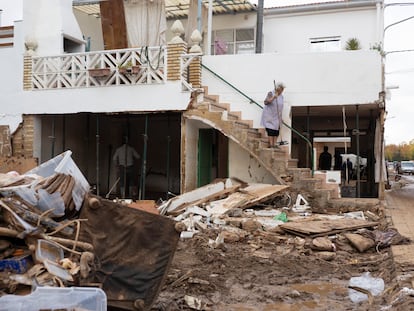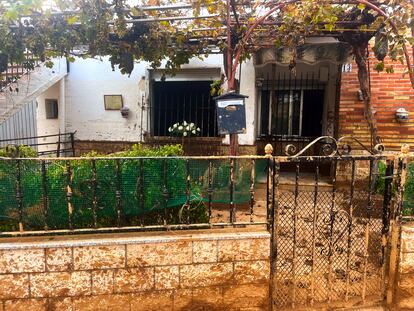Flooding in Spain: The homes that became death traps in a small Valencia town
The six people who died in Utiel were not out on the street or in underground garages, but at home where they believed they were safe. Many were elderly, and some tried desperately to save their spouses and children


By the time the residents of Valencia, in eastern Spain, began to receive storm alerts on October 29, six residents of Utiel were already dead. It was 8.11pm. The warnings to avoid road travel due to heavy rain not only came too late, they were irrelevant to these victims: they did not die on their way home from work, or on their way to the garage to pick up their cars. Anunciación, Enrique, Maruja, Julia, Colombina and Ángel all drowned in the living room of their own homes. “It was distressing because they called us to say they were drowning,” the mayor, Ricardo Gabalón, said a day after flash floods that have claimed over 200 lives and left a trail of destruction in their wake.
The youngest of those killed in Utiel was Enrique Ramos, who would have turned 59 on December 29. Enrique was wheelchair-bound and had very limited mobility. His 93-year-old mother, Pilar, looked after him. The story of how Pilar tried to save her son by attempting to drag him to the second floor and holding his head above water is horrific. “I don’t remember any more,” Pilar told EL PAÍS. “I only remember the part when I managed to climb the stairs and my son had already drowned.”
The Magro, which is normally a dry riverbed, broke its banks and the water, which rose three meters above its natural level, broke through the walls of the house like a tsunami. Pilar struggled to get her son closer to the staircase and lift him upstairs, but when she pulled on him, she was left holding his clothes in her hands. “He was almost at the banister. I was telling him to get a hold of it and he was saying, ‘But I can’t! I can’t see!” She holds up her hands to show the distance between her son and safety. He was off by about a foot.
Pilar’s screams as she watched her son drown alerted a local policeman who gained access to the house, diving through the water. “He risked his life, but he couldn’t see anything. He broke his hand,” says Queti, Enrique’s cousin. “Pilar doesn’t know how she mustered the strength to get upstairs and take off her clothes. She was freezing. She put on one of her son’s sweaters, which she is still wearing, and curled up in her room. The policeman covered her with a blanket from the bed and went to get help. At Enrique’s funeral, Pilar and the policeman met, hugged and cried together. Pilar said the rescuers finally found her son on the stairs, where she left him. Now she is shattered by the pain and also by guilt. She said that Enrique loved cars and had a prodigious memory.
He was almost at the banister. I was telling him to get a hold of it and he was saying, ‘But I can’t! I can’t see!’Pilar, 93, mother of Enrique Ramos
Guilt is a common emotion among Utiel survivors. Angel Moita was also unable to save his wife. The only way out of their living room was through a skylight, but 83-year-old Maruja was unable to climb up to it. “I told my wife ‘Get up!’ I tried to pull her out, but I couldn’t. She was slipping out of my arms,” the man explained before covering his face with his hands and bursting into tears. According to the couple’s daughter Fernanda, Maruja died around 6p.m., after spending several hours in the freezing water. Fernanda had been calling the collapsed 112 emergency number since noon while also sending out a cry for help on all the neighborhood chat groups. But with only her exhausted father on hand, Fernanda watched her mother die. “My mother has always been very caring; a very good person,” she said at the memorial mass.
In a house on the same street, Colombina and Ángel met the same fate. Dioni, the woman who took care of them, said on her way to the morgue, “I have worked with many people, but there’s no words to describe them. They were good, polite... I always felt like part of the family.” One of their sons, Ángel, declined to speak to EL PAÍS: “It’s not personal, but they were so lovely, they deserve to be left alone,” he said. The neighbors say that Ángel, who had better mobility than his wife, could have saved himself by going upstairs. Instead, he stayed with his wife until the end.
The neighborhoods near the river are still covered by mud that is difficult to clean. On a corner of Ramón y Cajal street, there is a small house with broken walls and a garden that was the pride of the neighborhood. This was home to Anunciación, 90, who drowned in her home around 1p.m. She phoned her daughters as the water levels in her home rose and said, “I’m exhausted from trying to get the water out. Don’t worry. It will be alright.” Her daughters tried to get help but it came too late. Anunciación’s dog Chispy survived, perched on a mattress floating around the house. “It’s such a sad death. With all she has worked for...,” said her daughter Mari Carmen.
Anunciación was a strong and independent woman, according to her daughter. Born in Valera de Abajo in Cuenca, she moved to Utiel to work as a maid in the local doctor’s house when she was still a child. The only time she left the village was for her wedding to Gustavo, who died more than 20 years ago. Every week after his death, she went to the cemetery to put flowers on his grave. Ultimately, she was in a lot of pain and suffered from poor eyesight, and the flowers for Gustavo from the flea market were left at home. Today, in her garden there is still a vine hung with muddy grapes, although in the window her daughters have left white roses.

Sign up for our weekly newsletter to get more English-language news coverage from EL PAÍS USA Edition
Tu suscripción se está usando en otro dispositivo
¿Quieres añadir otro usuario a tu suscripción?
Si continúas leyendo en este dispositivo, no se podrá leer en el otro.
FlechaTu suscripción se está usando en otro dispositivo y solo puedes acceder a EL PAÍS desde un dispositivo a la vez.
Si quieres compartir tu cuenta, cambia tu suscripción a la modalidad Premium, así podrás añadir otro usuario. Cada uno accederá con su propia cuenta de email, lo que os permitirá personalizar vuestra experiencia en EL PAÍS.
¿Tienes una suscripción de empresa? Accede aquí para contratar más cuentas.
En el caso de no saber quién está usando tu cuenta, te recomendamos cambiar tu contraseña aquí.
Si decides continuar compartiendo tu cuenta, este mensaje se mostrará en tu dispositivo y en el de la otra persona que está usando tu cuenta de forma indefinida, afectando a tu experiencia de lectura. Puedes consultar aquí los términos y condiciones de la suscripción digital.








































